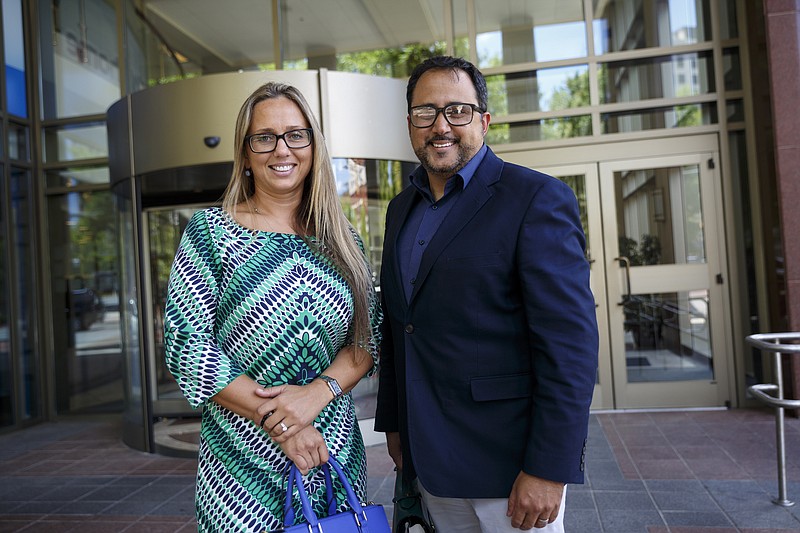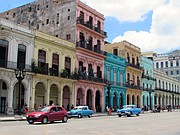Photo Gallery
Bridge of Understanding: Former Chattanoogan wants to explore similarities, differences between U.S. and Cuban millennials
Also read...
* Greeson: UTC grad films documentary about his daugher's quest to find her Cuban roots
Nikki Rios sees herself as a true Chattanooga homegirl although she is Cuban-American (with additional Venezuelan roots from mom and dad) who works as a tour guide in Miami, showing folks from all over the world the coolest hangouts and sights in the Florida city.
"I think of Chattanooga as my childhood home-I was born in Erlanger-and I love Chattanooga," the 24-year-old Rios said by phone from Miami. "It's the city that welcomed my parents into America."
Now she is trying to combine her Cuban and American heritages into a documentary web series that compares the lives of millennials in the Cuban cities of Havana and Trinidad to millennials in Chattanooga. She wants to show how the youth in both nations use (or can't use) social media, how they date, get to work, plan weddings, have babies, find jobs, find housing, have a night on the town, attend college - basically how they live their lives.
To make the documentary, however, she needs money. Her father, J.C. Cedeno, has been in town trying to raise the funds. He made a pitch to EPB, asking for a financial sponsorship so he could hire a local crew to shoot scenes in Chattanooga then go to Cuba for 10 days this fall to film there. On June 23, he got the good news that EPB decided to be a sponsor. EPB media strategist Niki Phillips says. The sponsorship would be in the form of financial support but the amount had not yet been decided.
"They want 10 million views online and most of those people won't matter to us, but this series will showcase Chattanooga in a way that's good for the city and we want to be part of that," says Phillips.
Cedeno hopes to make his pitch to several other local companies such as Coca-Cola and McKee Foods. He also plans to launch a Kickstarter fundraising campaign in July.
If they can raise $30,000 they should have a ready-made audience for the series since a Gallup poll shows 46 percent of U.S. millennials name Cuba as one of the top three destinations they most want to visit after Europe and Thailand.
Growing up
Miami is just 90 miles from Cuba, so it seems like it would be logistically much easier to compare the lives of millennials in Miami and the Cuban cities than trek all the way back to Chattanooga. But Rios can remember back to her days as a preschooler when she would accompany her dad to Chattanooga State Community College and play in the school's daycare center while her ambitious young immigrant father attended classes. She honed her English skills playing with the other kids.
"My mom spoke Spanish at home because that was her comfortable, go-to language, but my dad always insisted I speak English with him," Rios recalls fondly. "He wanted me to be assimilated. He was so determined to be American. It worked out well because I grew up with two languages. It's so much harder to learn a second language as an adult. "
By the time she was a teen, she was wearing cowboy boots and Levis while going to high school in Atlanta, where her family had moved.
"We visited Venezuela to visit my Dad's family a few times, most recently when I was 18," she says, "but that was before the food riots and political turmoil broke out so it was very safe to travel there.
"But I never really got to make a connection to our family heritage in Cuba because it was so difficult for Americans to go there. I am going to try and track down my grandfather's Cuban relatives while I'm still in Miami so we can visit them as part of the series."
As for the difference between hers and her father's last name, in Latin America, it is commonplace to use two last names and J.C.'s surname is Cedeno Rios. He chooses to use Cedeno for business. Erlanger simply wrote "Rios" on her birth certificate rather than "Cedeno Rios." She decided to use Rios as her professional name as a filmmaker.
Back to Cuba
This year, her father and stepmom, Greta, have visited the cities of Havana and Trinidad in Cuba for research. Since Rios was born in Erlanger hospital, the couple was curious about maternity wards in Cuba and how relatives get to visit newborns.
In both countries, the families are separated from the newborns by a glass window. But in Cuba, the nurses place the beds belonging to the new mothers in a window facing the sidewalk so passers-by can see the babies meet their moms. Cuban health-care professionals are known for their skill, but the U.S. trade embargo against Cuba - which has been in place since the Cuban Missile Crisis in 1962 - created some challenges for them so Cedenos decided to devote an entire episode to millennial medical care in Chattanooga and Cuba.
While in Cuba, the Cedenos stayed in a "casa particular," a private home that the Cuban government approves as lodging for tourists since the island has few large hotels. The casa had air conditioning but not internet.
"To get a Wi-Fi connection, we had to go to a luxury hotel and pay a fee per minute to get online," Cedeno says. "We noticed a huge group of kids in their 20s outside the window where we were working on our computer. They were all staring at their phones. We know that young people don't earn much money in Cuba, so we were curious how they could afford internet on their phones."
The kids explained they each had bought a black-market app that lets them hack into the luxury hotels' Wi-Fi. Cedeno was fascinated because the young adults' window of log-on opportunity was so limited, yet they seemed able to plan their days and hook-ups via their scant social media. With that in mind, another episode of the web series will compare technology in the two countries.
In other episodes, Rios wants to compare favorite Chattanooga hangouts to those in Havana. She wants to learn about the politics of Cuban millennials and contrast them to the issues that Chattanoogan millennials embrace, which could be groundbreaking since American vs. Cuban political stories are usually told by baby boomers through the filter of the Cold War and the botched Bay of Pigs invasion in 1961, the ground zero for the poisoned relationship between Cuba and America and the lead-in to the Cuban Missile Crisis the next year.
Yesterday and today
Cedeno hopes to arrange a visit for Rios to the Bay of Pigs and the beach is where 1,500 Cuban exiles trained by the CIA invaded Cuba in November 1961 to overthrow dictator Fidel Castro. Badly outnumbered, 114 of the exiles died while 1,100 were taken prisoner. Declassified documents showed the CIA misled the exiles about the scant military support President. John F. Kennedy was willing to provide.
It can be difficult for Americans outside Miami to grasp how deep a scar all this left on Cuban-Americans' hearts, but it helps clarify why they vehemently defended the trade embargo and travel bans for so many decades. Throughout the 1970s, bombs exploded inside Miami stores and at news organizations perceived as too soft on Castro. In 1976, Emilio Milian, the popular news director on WQBA-AM, denounced the bombers as terrorists. His car was promptly destroyed by a bomb that severed his legs.
Rios will be meeting and interviewing Cubans who were born decades after these tragedies. These days, even the Cuban millennials know Castro primarily as an old, feeble man who once ruled the island but retired in 2008.
"In Miami, my friends and I understand the pain our parents and grandparents experienced because of Castro's regime and we respect their views," Rios says. "Millennials in Cuba are probably like millennials in America who want to make decisions about their lives, their country. They may see America in a completely new way.
"This is a chance for me to reconnect with my heritage. And the millennials I meet may make Cuba into something Americans may want to be part of when it comes."
Contact Lynda Edwards at 423-757-6391 or ledwards@timesfreepress.com.

